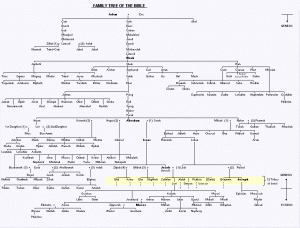These are the descendants of Shem. When Shem was one hundred years old, he became the father of Arpachshad two years after the flood; and Shem lived after the birth of Arpachshad for five hundred years, and had other sons and daughters.
When Arpachshad had lived for thirty-five years, he became the father of Shelah; and Arpachshad lived after the birth of Shelah for four hundred and three years, and had other sons and daughters.
When Shelah had lived for thirty years, he became the father of Eber; and Shelah lived after the birth of Eber for four hundred and three years, and had other sons and daughters.
When Eber had lived for thirty-four years, he became the father of Peleg; and Eber lived after the birth of Peleg for four hundred and thirty years, and had other sons and daughters.
When Peleg had lived for thirty years, he became the father of Reu; and Peleg lived after the birth of Reu for two hundred and nine years, and had other sons and daughters.
When Reu had lived for thirty-two years, he became the father of Serug; and Reu lived after the birth of Serug for two hundred and seven years, and had other sons and daughters.
When Serug had lived for thirty years, he became the father of Nahor; and Serug lived after the birth of Nahor for two hundred years, and had other sons and daughters.
When Nahor had lived for twenty-nine years, he became the father of Terah; and Nahor lived after the birth of Terah for one hundred and nineteen years, and had other sons and daughters.
When Terah had lived for seventy years, he became the father of Abram, Nahor, and Haran.
Descendants of TerahNow these are the descendants of Terah. Terah was the father of Abram, Nahor, and Haran; and Haran was the father of Lot. Haran died before his father Terah in the land of his birth, in Ur of the Chaldeans. Abram and Nahor took wives; the name of Abram’s wife was Sarai, and the name of Nahor’s wife was Milcah. She was the daughter of Haran the father of Milcah and Iscah. Now Sarai was barren; she had no child.
Terah took his son Abram and his grandson Lot son of Haran, and his daughter-in-law Sarai, his son Abram’s wife, and they went out together from Ur of the Chaldeans to go into the land of Canaan; but when they came to Haran, they settled there. The days of Terah were two hundred and five years; and Terah died in Haran.
The one thing about the book of Genesis is there is a lot of begetting. Chapter 11:10-32 is an excellent example of the begat phenomena, if you will. One is tempting to ask though, who cares? Does it matter that so and so had a child, lived for so many years and died and then the son had so many children and they were who again?
Here we have the descendants of Shem, leading in a line to Abram finally, who will become for us Abraham, the Father of Faith. But we are getting a bit ahead of ourselves there. First, why does it matter who begat who? Are we not all God’s children?
Practically, this passage gives us the lineage of the covenant. God will establish His covenant with Abraham, but before he did he first established a covenant with Noah. The lineage is meant to reflect that those who come after are inheriting the covenant, the obligations but also the benefits. This is key for us as Christians and also key for the author of the Gospel of Matthew, who traces Jesus lineage to Abraham in the same fashion. But once again we are way ahead of ourselves.
This passage is a means of establishing human hierarchy. Remember that Noah blesses Shem, and the descendants of Ham, Canaan, are to be the slaves of his brother and his brother’s descendants. This passage helps to clearly distinguish between the “other” and helps establish the people of God as belonging to a cosmic order already.
In many respects the passage promotes what we would call nationalism today, although a few thousand years ago, that concept wouldn’t make sense, but it would be more akin to tribalism and the concept that some humans are attached to the divine and cosmic orders, while others can be slaves, purchase and are not people of the covenant and cosmic order; not set aside as special.
While lineage does mark one as part of particular community with historical roots and an ancient community which is good, it can also have dangerous effects, like alienating one from the rest of society, in this case from the rest of humanity. It has a separating effect.
The ability to trace a lineage to divine covenants is not particular to the Israelites, in fact we in many ways continue this tradition today in the form of nation states. Germany saw itself as the chosen people, the US sees itself as fulfilling a manifest destiny and I am sure we will continue into the future not building bridges, but erecting barriers. And we must confront that our heritages and lineages while they help define who we are, they also define who is not “us.”

